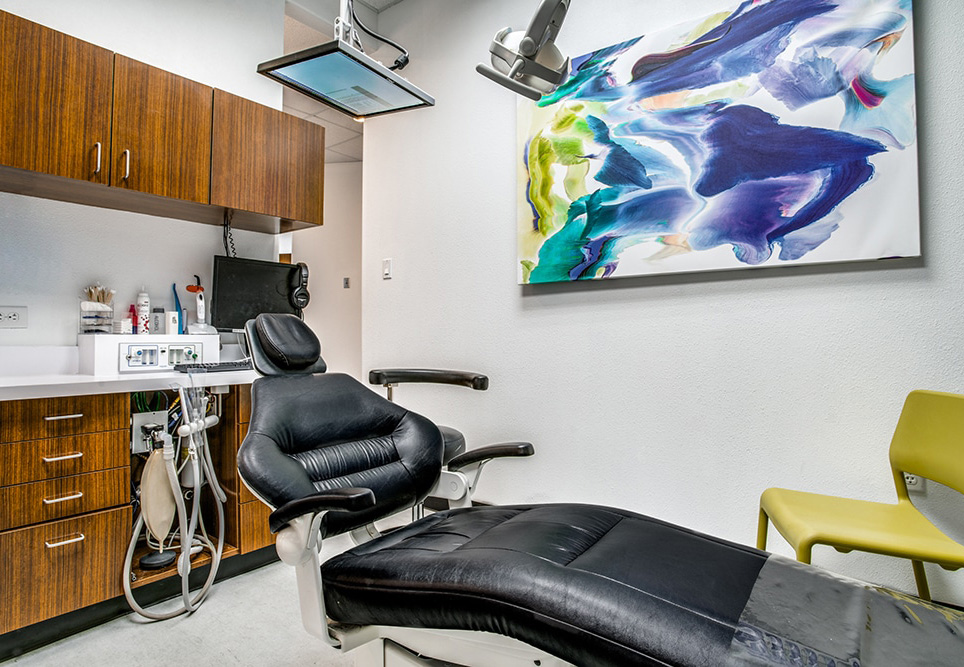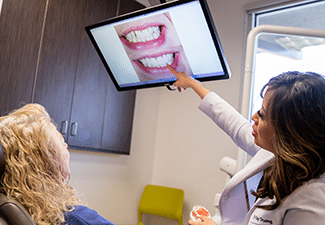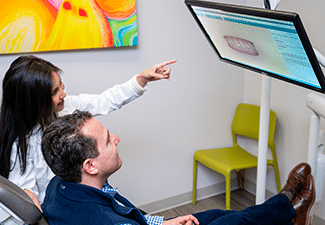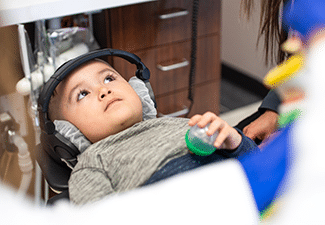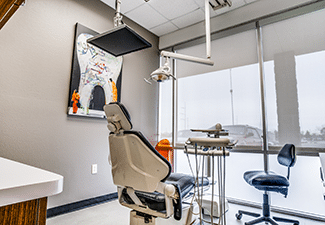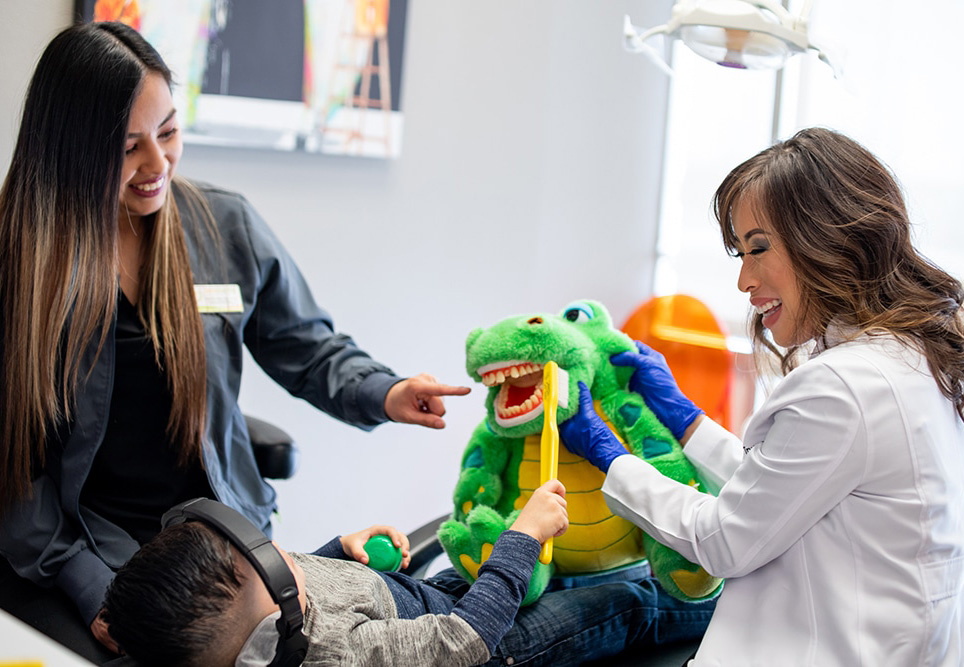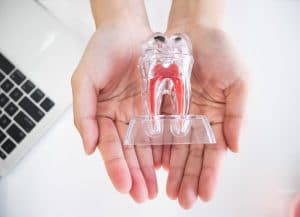
While we’re closing our doors for routine general and preventive care, or for cosmetic treatments, we’re still helping residents of Richardson and Dallas, TX, with emergency dental care. In addition to damaged teeth, emergency treatment also addresses serious oral health concerns, such as an infected tooth. In today’s blog, we’re going to look at when you should contact our team for treatment, and how we put a stop to an infection or abscess that threatens your smile.
What Causes a Tooth to Become Infected?
The enamel coating our teeth is not only the toughest material in the human body, but it acts as a barrier to protect the sensitive inner tissues from tooth decay and infection. Poor oral hygiene, and diets high in sugar and starch, could leave particles on or between the teeth. As bacteria break down these trapped bits of food, oral acidity increases and the teeth become coated in plaque. Unless removed, the plaque could begin to weaken and erode tooth enamel. Since the inner layers of dentin, which make up most of the tooth structure, are more sensitive, a cavity forms.
Tooth decay grows with time and unless treated, could spread and reach the inner pulp. Your tooth’s center, the pulp, oversees the flow of blood and nutrients to and from the tooth. When bacteria reach the pulp, the tooth becomes infected. Treatment is crucial, otherwise the infection could eventually kill the pulp, which allows infection to reach other teeth or move into the jawbone. You could lose the tooth altogether!
When to See Our Team
How do you know when you should contact us about your smile? Well, people with advanced cases of decay or infection may report persistent tooth sensitivity and toothaches. As the issue grows more severe with time, pain when biting down or eating could arise, as well as swelling near the infected tooth or even a foul discharge from it. If you begin to experience one or more of these potential warning signs, then please talk to our team. Treatment helps ensure your tooth stays in place, and that you avoid increasing discomfort.
The Root Canal Process
First, give us a call so we can set up a time to see you. When you arrive, you will have the waiting room to yourself. We ensure this to help protect the health of our patients from COVID-19. In between each visit, our team will also thoroughly clean and disinfect surfaces throughout office. Our team members will be washing hand as well, and following strict health and safety protocols.
We’re going to administer a local anesthetic, and may suggest sedation for patients with dental anxiety. We want to ensure you feel calm and comfortable throughout the procedure. Once you’re comfortable, we will open the tooth to access and remove the infected tissues from within. We clean the interior of the tooth and then add a special restorative material known as gutta percha. We cure this material, and then we need to cap the tooth to prevent further decay or an infected. We create a custom-made crown, using durable and lifelike materials such as ceramic. In fact, we can often shade the crown to match the color of surrounding teeth! When we place the crown, this completes the procedure and then protects your smile from painful symptoms or the risk of losing the tooth!
Keeping Smiles Safe from Home
The root canal helps protect your smile, and we offer this procedure and lifelike restorations to address issues like infection, advanced tooth decay, or even chipped or cracked teeth. However, since we can’t offer routine checkups and cleanings at the moment, then you definitely need to care for your smile from home to lower your risk of cavities, gingivitis, or even gum disease. We recommend everyone in your household, even your little ones, start the day by brushing their teeth for about two minutes. Use a toothpaste with fluoride, which helps strengthen the outer layer of tooth enamel. For toddlers and young children, use a rice-sized blot of fluoride toothpaste. Everyone else should use a pea-sized one. You need to brush your teeth again before going to bed as well.
Make time to floss before bed too! Flossing removes what a toothbrush’s bristles cannot reach, lowering your risk of periodontal issues or cavities. As soon as your children have teeth sitting side-by-side, they need to floss. Be sure to cut back on sugary foods and drinks too, as these items leave behind particles to feed and fuel harmful bacteria. Instead, try to add more fresh fruits and vegetables to your meals. For snacks, you can once again turn to fruits and veggies, as well as yogurts, sugar-free gum, cheeses, nuts, or whole grain crackers. To help protect yourself and your family from COVID-19, we suggest washing your hands frequently with soap and water. Each time should take about 20 seconds, and reach the backs of the hands and your fingertips. Limit trips to stores, and practice social distancing, staying six feet away from others at all times. Be sure you wear a mask when possible. You can find instructions online from the Centers for Disease Control on how to build your own mask to keep you and your family safe when outdoors or grocery shopping.
Of you have any questions about keeping your smile healthy, or about seeing us for emergency issues, like damaged teeth or oral health concerns, then contact our team today. We want to make sure we all stay safe and healthy during this time, and we can’t wait to see you again!
Do You Need a Restorative Treatment?
If you begin to notice changes in your smile, such as sore or aching teeth, then please let us know. We don’t want a treatable oral health issue to lead to something more severe, such as tooth loss. For more information on our approach to emergency dental care, then schedule a consultation by calling the Viva Dental Family Dentistry office nearest you at (214) 337-7800 (Dallas) or (972) 437-6000 (Richardson). We’re proud to serve residents of Dallas, Richardson, and surrounding communities!







